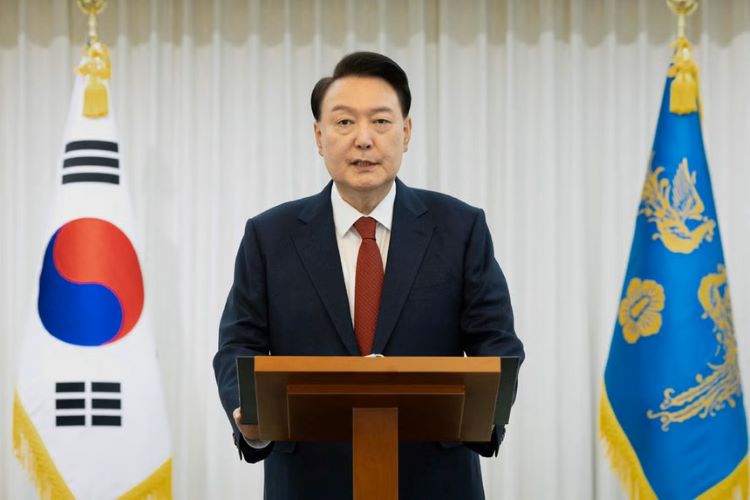Arrest Warrant Issued for South Korea’s Suspended President

South Korea is facing a significant political crisis as a court has issued an arrest warrant for suspended President Yoon Suk Yeol. This unprecedented move follows Yoon’s controversial attempt to impose martial law on December 3. The situation has escalated, with Yoon now facing serious charges, including insurrection and abuse of power. This article explores the implications of the arrest warrant, the ongoing political turmoil, and the challenges investigators may face in executing the warrant.
Background of the Political Crisis
The political landscape in South Korea has been tumultuous since Yoon Suk Yeol declared martial law. This declaration was met with widespread criticism and led to his impeachment by parliament. Yoon is the first sitting president in South Korea to face an arrest warrant, highlighting the severity of the situation. The court’s decision to issue the warrant came after Yoon ignored three summonses to appear for questioning over the past two weeks. Investigators are now seeking to question him regarding allegations of insurrection and abuse of power.
Yoon’s legal team has described the warrant as “illegal,” arguing that the president has the constitutional authority to declare martial law. Despite this defense, the political crisis continues to deepen. The public’s reaction has been mixed, with some supporting Yoon and others demanding accountability for his actions. The political turmoil has not only affected Yoon but also his successor, who has faced impeachment as well. This ongoing crisis raises questions about the stability of South Korea’s political system and the future of its leadership.
Challenges in Executing the Arrest Warrant
The arrest warrant issued against Yoon Suk Yeol gives investigators 48 hours to apprehend him for questioning. However, it remains uncertain whether they will be able to execute the warrant. Yoon’s security team and supporters have previously blocked investigators from entering the presidential office and his private residence. This pattern of resistance has raised concerns about the ability of law enforcement to carry out their duties effectively.
In the past, South Korean authorities have faced challenges when attempting to arrest prominent politicians. Supporters often physically obstruct police efforts, making it difficult to enforce legal actions. Yoon’s legal team has also claimed that investigators lack the authority to arrest him, further complicating the situation. The tension surrounding the warrant has created a volatile environment, with potential protests and confrontations looming.
Legal and Political Implications
The legal implications of this situation are significant. Yoon has been suspended from his presidential duties since December 14, following his impeachment. However, he can only be removed from office if the constitutional court upholds the impeachment. Currently, the court has only six judges on its nine-member bench, meaning a single rejection could prevent Yoon’s removal. This precarious balance raises questions about the effectiveness of the judicial system in addressing political accountability.
The opposition has been actively seeking to strengthen their position by nominating additional judges to the constitutional court. However, their proposal was recently vetoed by Prime Minister Han Duck-soo, further complicating the political landscape. In response, opposition lawmakers have voted to impeach Han, who has been acting as the leader since Yoon’s suspension. The opposition’s actions indicate a growing determination to hold the government accountable, but they also risk escalating tensions within the political arena.
Future Prospects for South Korea’s Leadership
As the situation unfolds, the future of South Korea’s leadership remains uncertain. Yoon Suk Yeol’s whereabouts are currently unknown, and he has been banned from leaving the country. His legal team insists that he will not evade his responsibilities, but the ongoing political crisis raises doubts about his ability to navigate the challenges ahead. The opposition’s threats to impeach other key figures, such as Finance Minister Choi Sang-mok, indicate a willingness to pursue accountability at all levels of government.
The political crisis in South Korea is a critical moment in the nation’s history. The outcome of Yoon’s legal battles and the ongoing power struggles within the government will shape the future of South Korean politics. As citizens watch closely, the implications of these events will resonate far beyond the immediate political landscape, influencing public trust and the stability of the country’s democratic institutions.
Observer Voice is the one stop site for National, International news, Sports, Editor’s Choice, Art/culture contents, Quotes and much more. We also cover historical contents. Historical contents includes World History, Indian History, and what happened today. The website also covers Entertainment across the India and World.

